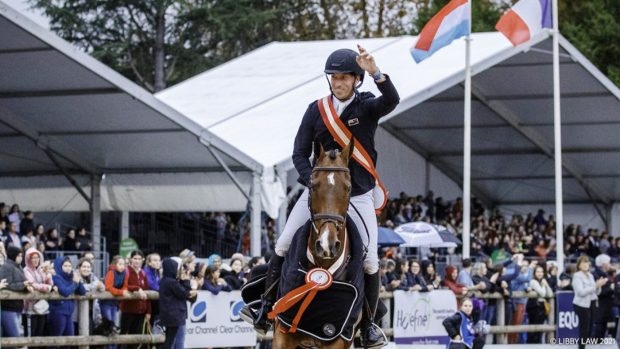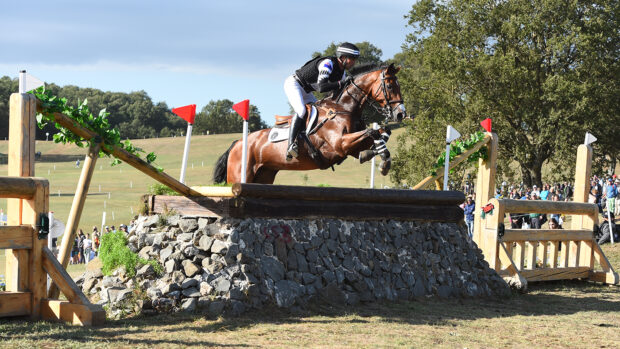Mark Phillips on the final countdown to the Paris Games and recent FEI issues
Last weekend was the final chance for pairs to complete their qualifications or impress selectors before longlist Olympic eventing entries had to be made on Monday (24 June). Let’s just say there was a little tension in the air out at Strzegom in Poland. Meanwhile, over in the USA, horses had their final outing at Stable View, over an advanced track that I laid out.
Next weekend most British hopefuls and UK-based overseas riders will tackle another special advanced course that I’m designing at Aston-le-Walls, while many of the European nations will sample the electric atmosphere at Aachen CHIO, over Rüdiger Schwartz’s last track there. Giuseppe de la Chiesa takes over at Aachen next year before designing the course for the 2026 World Championship at that venue.
 Watch the video
Watch the videoBy next weekend, all the appeal windows for selection will be closed and we’ll find out who’s off to Versailles.
Although countries fielding teams have the expense of sending four riders to the Paris Olympics, only three will start. The fourth waits in the wings as a substitute. Nations can substitute between phases for medical or veterinary reasons for 20 penalties, with additional penalties for a pair not completing a phase – 100 in dressage or showjumping and 200 in cross-country. In certain circumstances, no substitution is allowed.
The overreach London 52 suffered in Luhmühlen, which stopped him showjumping, highlights the fact that such an injury can happen to any horse and the folly of the three in a team and all-to-count format. We got away with it in Tokyo, where none of the major players had to substitute, but eventually this will bite a team. A rider could win a medal having done only the showjumping phase.
We all need to hope for a safe and successful competition in Paris, because the decision on the inclusion of equestrian sports at the Los Angeles Games has now been put off until December. We are at risk.
At 126 metres per jumping effort, riders have never been asked to tackle an Olympic track faster than in Paris and the multiple sharp turns and four water jumps will only accentuate the problem. I’m not quite sure where this sits with the FEI risk management policy!
Bit drama
The FEI is in trouble over the Myler combination bit. The focus seems to be the cord over the horse’s nose. There has been much confusion over what the bit looks like in its original design and whether that – or an altered version – is allowed.
Athletes and stewards are up in arms trying to understand what is acceptable and we are seeing different interpretations around the world. We’ve seen a rider eliminated for using the bit in its standard form and being told it has been modified, while elsewhere a rider was asked to make alterations to the bit and then permitted to compete. Meanwhile at another event, a similar bit with a noseband made of leather and sheepskin rather than a cord was allowed.
I feel sorry for Myler, which has pioneered the creation of bits to make horses happier in the mouth.
What a mess just before the Olympics! If only the FEI had waited to get advice from a group of officials, vets and athletes. It doesn’t help that the FEI tack app only works if you have wifi or phone reception, which is not the case in every collecting ring.
The BE Calendar
Back home in the UK, British Eventing (BE) is endeavouring to create a calendar for 2025 by the end of July and has asked organisers for their preferred dates and classes. With recent weather changes, some venues wanting to move dates and others to rejoin, 2025 will be a compromise.
Organisers are also being asked to submit expressions of interest in FEI classes, BE championships and advanced classes for 2026, so the new calendar can hopefully give them a six-year security of tenure and therefore confidence to invest.
This will inevitably produce a big shake-up in the calendar, with some organisers potentially being allowed to run more classes to help pay for the ever-spiralling costs of staging upper-level events.
● How do you think the three-to-a-team format will affect the results in Paris? Write to us at hhletters@futurenet.com, including your name, nearest town and country, for the chance for your letter to appear in a forthcoming issue of the magazine
- This exclusive column will also be available to read in Horse & Hound magazine, on sale Thursday 27 June
You might also be interested in:

The Olympic eventing format – all your questions about penalties and substitutions answered

Concern and confusion as FEI bans bit used by top riders

Paris Olympic eventing teams: find out who will ride at the Games

Subscribe to Horse & Hound magazine today – and enjoy unlimited website access all year round
Horse & Hound magazine, out every Thursday, is packed with all the latest news and reports, as well as interviews, specials, nostalgia, vet and training advice. Subscribe today and enjoy the magazine delivered to your door every week, plus unlimited website access and digital versions of the magazine dating back to September 2012.




